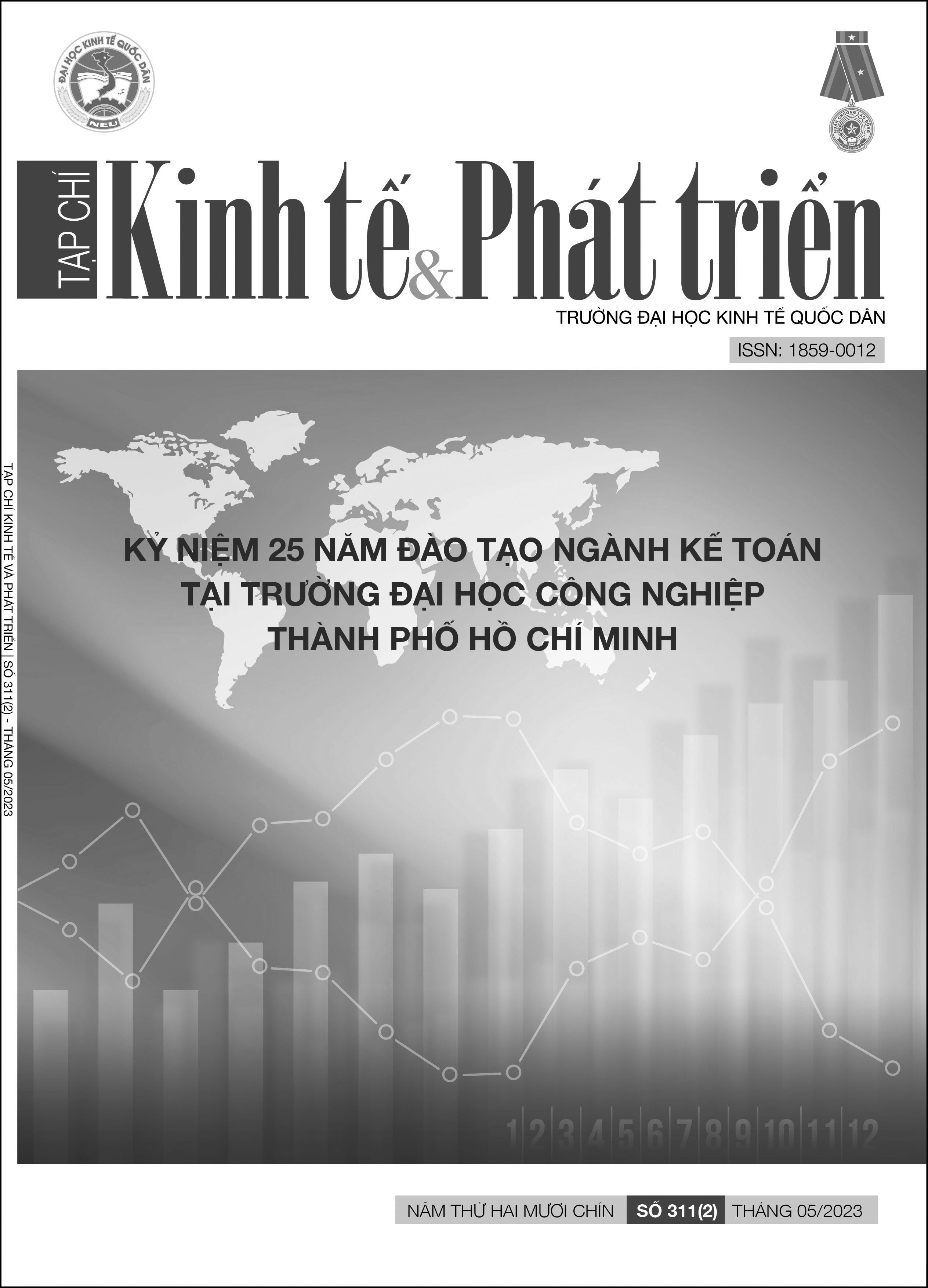Tổng quan văn hoá tổ chức qua phân tích trắc lượng thư mục bằng VOSviewer
DOI:
https://doi.org/10.33301/JED.VI.1206Từ khóa:
Phân tích trắc lượng thư mục, Văn hoá tổ chức, VOSviewerTóm tắt
Văn hóa tổ chức đóng một vai trò quan trọng trong việc hình thành lợi thế cạnh tranh. Đã có nhiều nghiên cứu được thực hiện bằng cách phân tích tài liệu tham khảo của các nghiên cứu với mô hình trực quan. Nghiên cứu này cung cấp thông tin rộng rãi về văn hoá tổ chức, bao gồm các tác giả, tạp chí, quốc gia và tài liệu tham khảo. Sử dụng nguồn dữ liệu Scopus từ năm 1969 đến 2023 với 4731 nghiên cứu về văn hoá tổ chức để phân tích trắc lượng thư mục với sự hỗ trợ của phần mềm VOSviewer kết hợp với phần mềm MS Excel và Publish and Perish của Harzing. Kết quả phân tích được tổng hợp qua các bảng số liệu và trực quan bằng hình ảnh. Tuy nhiên, nghiên cứu này chỉ sử dụng nguồn dữ liệu từ Scopus nên kết quả phân tích có thể chưa bao quát được toàn bộ các nghiên cứu đã xuất bản. Những nghiên cứu tiếp theo có thể bổ sung thêm dữ liệu từ các nguồn khác để gia tăng tính khách quan của kết quả nghiên cứu.
Tài liệu tham khảo
Ahmi, A., & Mohd Nasir, M. H. (2019), ‘Examining the trend of the research on extensible business reporting language (XBRL): A bibliometric review’, International Journal of Innovation, Creativity and Change, 5(2), 1145-1167.
Annesley, T. M. (2010), ‘The title says it all’, Clinical Chemistry, 56(3), 357-360.
Barney, J. B. (1986), ‘Organizational Culture: Can It Be a Source of Sustained Competitive Advantage?’, Academy of Management Review, 11(3), 656–665.
Büschgens, T., Bausch, A., & Balkin, D. B. (2013), ‘Organizational culture and innovation: A meta‐analytic review’, Journal of Product Innovation Management, 30(4), 763-781.
Calori, R., & Sarnin, P. (1991), ‘Corporate Culture and Economic Performance: A French Study’, Organization Studies, 12(1), 049–074.
Cui, Y., Liu, Y., & Mou, J. (2018), ‘Bibliometric analysis of organisational culture using CiteSpace’, South African Journal of Economic and Management Sciences, 21(1), 1-12.
El Baz, J., & Iddik, S. (2022), ‘Green supply chain management and organizational culture: a bibliometric analysis based on Scopus data (2001-2020)’, International Journal of Organizational Analysis, 30(1), 156-179.
Gordon, G. G., & DiTomaso, N. (1992), ‘Predicting Corporate Performance from Organizational Culture*’, Journal of Management Studies, 29(6), 783–798.
Ginting, J. G. (2023), ‘Organizational culture: An overview and bibliometric analysis’, Asian Journal Of Economics And Business Management, 2(2), 534 – 542.
Jamali, H. R., & Nikzad, M. (2011), ‘Article title type and its relation with the number of downloads and citations’, Scientometrics, 88(2), 653-661.
Pinto, C. F., Serra, F. R., & Ferreira, M. P. (2014), ‘A bibliometric study on culture research in International Business’, Brazilian Administration Review, 11, 340-363.
Qin, X., Wang, R., Huang, Y. N., Zhao, J., Chiu, H. C., Tung, T. H., Harrison, J. & Wang, B. L. (2023), ‘Organisational Culture Research in Healthcare: A Big Data Bibliometric Study’, Healthcare, 11(2). DOI: https://doi.org/10.3390/healthcare11020169.
Van Eck, N. J., & Waltman, L. (2017), ‘Citation-based clustering of publications using CitNetExplorer and VOSviewer’, Scientometrics, 111, 1053-1070.
Van Eck, N. J., Waltman, L., Dekker, R., & Van Den Berg, J. (2010), ‘A comparison of two techniques for bibliometric mapping: Multidimensional scaling and VOS’, Journal of the American Society for Information Science and Technology, 61(12), 2405-2416.
Wilkins, A. L., & Ouchi, W. G. (1983), ‘Efficient Cultures: Exploring the Relationship Between Culture and Organizational Performance’, Administrative Science Quarterly, 28(3), 468–481.
Zakaria, R., Ahmi, A., Ahmad, A. H., & Othman, Z. (2021), ‘Worldwide melatonin research: a bibliometric analysis of the published literature between 2015 and 2019’, Chronobiology International, 38(1), 27-37.





